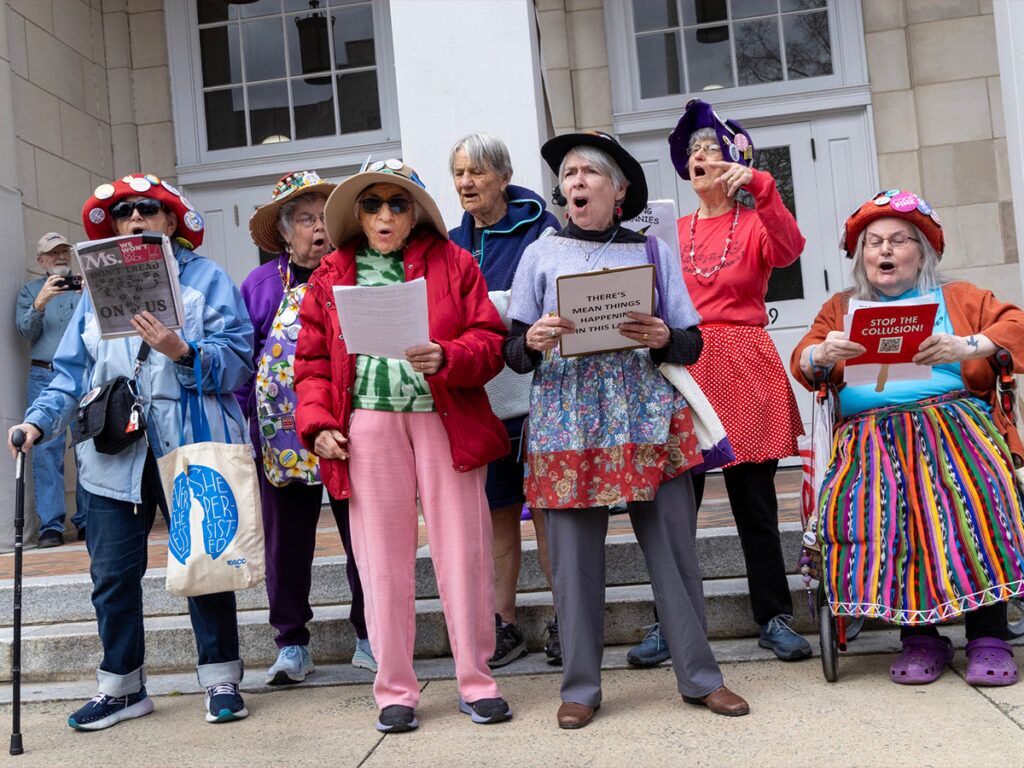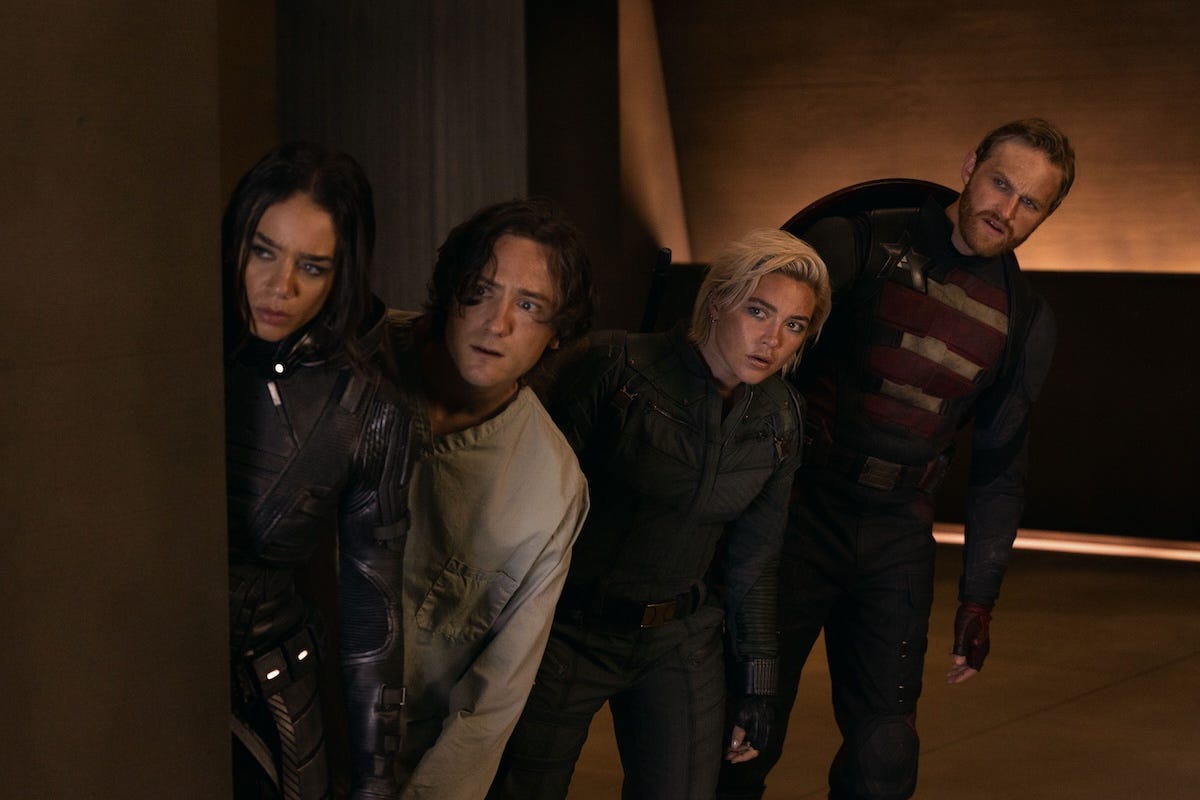
‘We Need a Gentle Anger’: The Triangle’s Raging Grannies are Protesting Injustice through Music
May 2, 2025
The Most Persuasive ‘People’ on Reddit Were a Front for AI
May 2, 2025I am, generally, a stickler for the rules of movie theater etiquette. People should stay off their phones, stop their chattering, and focus on the screen. But on Wednesday night at the AMC NorthPark in Dallas, I went to a movie theater hoping to hear someone speak.
Kevin Smith was in town, touring the 25th anniversary rerelease of Dogma and doing a Q&A session afterwards. As a longtime fan of Smith—Mallrats and Chasing Amy were formative events in my moviegoing youth—I’ve long wanted to attend an event such as this one. As anyone who has listened to one of the commentary tracks on his film’s home video releases or who has watched one of his An Evening with Kevin Smith films will happily tell you, the man is a born raconteur. He can jabber at length about nearly anything. Or nothing. Sometimes both.
The Dogma screening was no exception; he took questions for nearly 80 minutes after the film ended on topics ranging from the protests surrounding the film (there were fewer this time around) to his relationship with Alan Rickman (a genuinely touching friendship between two artists with great respect for each other). It was a funny, profane, and occasionally profound discussion, with some neat little newsy tidbits thrown in. (One of them being that Smith recently had a budget meeting for his long-planned feature Moose Jaws, which he describes as “Jaws but with a moose instead of a shark.” They had to decide how many shots needed computer-generated moose and how many would need practical moose. Needless to say, the audience was thrilled.)
The Q&A is what the audience paid $50 a ticket for, of course, and it was great. But equally fun was the screening itself: a raucous, rowdy affair, with lots of cheering and lots of laughter. There were cosplayers (fans of the film would recognize the Silent Bob-style trench coats, the two Buddy Christs, and the one Holy Bartender). This was not your typical screening—nearly everyone had already seen the movie, naturally—and if it had been my first time watching the movie I might have been annoyed. But this was less a movie night than a party, a gathering of the View Askew faithful. “This is my idea of church,” the once-but-no-longer-faithful Smith said by way of kicking things off. If it were a religious service, it would take place in a revival tent with a charismatic preacher at the pulpit.
Richard Rushfield earlier this week offered up a dichotomy in the world of mainstream moviegoing, the shift from “franchise” to “FOMO” (“fear of missing out”). I don’t think this breakdown is entirely correct—the reason the Marvel Cinematic Universe was so successful for so long is that there was a genuine FOMO when it came to getting hit with spoilers or missing post-credits scenes connecting the various mini-franchises under the MCU umbrella—but it’s certainly directionally correct, and the Dogma anniversary show is a pretty perfect example of this paradigm.
This sort of thing isn’t easy to replicate; not every screening is going to feature a beloved indie filmmaker holding forth in front of his cult. But the energy felt familiar. It was like the energy I felt before seeing Sinners on 70mm IMAX at a packed Tuesday morning showing, the crowd buzzing with excitement and ready to tell the characters on the screen precisely what to do by yelling at them as if they can hear. Or like seeing Interstellarin the same format at the same theater five months earlier, another mid-morning showing that folks took off work to attend, traveling huge distances to experience something you simply can’t get at home. Or like the 20th anniversary screenings of Revenge of the Sith, audiences filled with folks waving lightsabers. Or like being in a theater full of middle school kids screaming “Chicken Jockey” on the opening weekend of Minecraft.
Again, I have slightly mixed feelings about all this; I probably prefer the reverence of the Interstellar crowd to the raucousness of the Sinners set, but these are also very different movies with very different goals aimed at very different audiences. Calibrating your expectations is at least part of the moviegoing experience, and giving yourself over to the energy of the crowd can be a key part of that.
Make sure to check out this week’s Bulwark Goes to Hollywood; I talked to Jeremy Workman about his documentary, Secret Mall Apartment, which is making the theatrical rounds now. If it’s playing near you, I hope you consider checking it out: It’s a surprisingly moving look at artists having some fun with the changes gentrification has brought to their Rhode Island town.
Bulwark Goes to Hollywood
The Hidden Art of ‘Secret Mall Apartment’

On this week’s episode, I’m joined by Jeremy Workman, the director and producer of Secret Mall Apartment. We discussed the difficult process of getting your subjects to trust you, the trickiness of distributing an indie documentary in the modern cinematic landscape, and the importance of having a big star like Jesse Eisenberg willing to do a little pres…

I think it’s fair to say that the Marvel Cinematic Universe has been stuck in a rut in recent years. The triumphs, like Guardians of the Galaxy, Vol. 3, have been few and far between, while every competent release for a new property like Shang-Chi has been paired with a disaster like The Eternals. For the most part, we’ve had stultifying sequels served up to us in the hopes of propagating the overarching story, from the Ant-Man and the Wasp: Quantumania’s aborted Kang plotline to the disastrous mess that was The Marvels clumsily trying to work mutants into the MCU. The competent fluidity of the series has been lost. Judging by the box office returns and the Rotten Tomatoes averages, audiences are losing interest and critics have gotten much more discerning about fare from Burbank.
Thunderbolts* isn’t likely to turn everything around for Marvel all on its own, but it’s a solid return to form for the house that Kevin Feige built. With charming stars delivering solid performances, just enough callbacks to please fans without making the film feel like a soulless exercise in general brand extension, and an honest-to-goodness thematic throughline heightened by visual motifs culminating in an emotional payoff, Thunderbolts*is a pleasingly competent entry in a series that has desperately needed one for a while now.
The Thunderbolts are kind of like Marvel’s B Team heroes, operatives pulled together by Valentina Allegra de Fontaine (Julia Louis-Dreyfus) as head of the CIA and former executive of some shady not-quite-SHIELD group. She’s currently facing impeachment proceedings and trying to eliminate evidence of her misdeeds, hence her desire to gather former Red Room assassin and Black Widow sister Yelena (Florence Pugh), failed Captain America John Walker (Wyatt Russell), experiment-gone-wrong Ghost (Hannah John-Kamen), and master assassin Taskmaster (Olga Kurylenko) in the same place. Also there: Bob (Lewis Pullman), an amnesiac with mysterious powers whom no one is quite sure what to make of.
Yadda yadda yadda, the team is joined by the Winter Soldier, Bucky Barnes (Sebastian Stan), who is chafing at the limits of his power as a first-term congressman, and Yelena’s “father,” Alexei Shostakov (David Harbour), aka the Red Guardian, the USSR’s answer to Captain America. They must come together to stop a shadow-like entity spreading across New York City and absorbing everyone in its path before it destroys the world. Typical super-team stuff.
Again, this is all pretty straightforward and I don’t think there will be much in the way of surprises on a beat-by-beat basis for anyone familiar with this sort of movie. But Thunderbolts* has two big things going for it. First, is the cast, which is uniformly winsome. Stan has come into his own over the last decade playing frustrated leaders to perfection, and Russell has his dad Kurt’s roguish charm and square chin. Pugh does heartachingly lonely incredibly well, as anyone who saw her in Oppenheimer knows; her Yelena is saddled with a crippling depression that comes from feeling alone in the world. Harbour is always fun comic relief, while Pullman (who also looks like his dad, Bill) nails the quiet angst that defines this film.
And it is an angsty film; one imagines a rejected subtitle along the lines of The MCU Goes to Therapy. Director Jake Schreier does a good job of reflecting that darkness on the screen, literally, through a repeated use of shade and shadow; when we first see Yelena in action, she’s enshrouded in darkness, taking down a team of security guards who themselves are reduced to little more than black shapes. These literal shadows foreshadow the darkness to come and a real sadness at the heart of a movie about misfits who want to be loved and have the power to make the public love them but haven’t quite figured out the best way to accomplish that. Who among us can’t identify with the desire to be appreciated by someone, anyone?
Thunderbolts* doesn’t reinvent the wheel and it doesn’t reset the MCU, but it is reasonably entertaining and even manages to sneak a few ideas into the mix. Good enough.
Great Job Sonny Bunch & the Team @ The Bulwark Source link for sharing this story.




